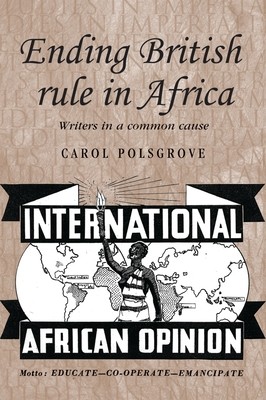
- We will send in 10–14 business days.
- Author: Carol Polsgrove
- Publisher: Manchester University Press
- ISBN-10: 0719089018
- ISBN-13: 9780719089015
- Format: 15.6 x 23.4 x 1.1 cm, softcover
- Language: English
- SAVE -10% with code: EXTRA
Reviews
Description
On the eve of World War II, a small, impoverished group of Africans and West Indians in London dared to imagine the unimaginable: the end of British rule in Africa. In books, pamphlets, and periodicals, they launched an anti-colonial campaign that used publishing as a pathway to liberation. These writers included West Indians George Padmore, C. L. R. James, and Ras Makonnen, Kenya's Jomo Kenyatta and Sierra Leone's I. T. A. Wallace Johnson, and they made their point: that colonial rule was oppressive and inconsistent with the democratic ideals Britain claimed at home.
Ending British rule in Africa draws on previously unexplored manuscript and archival collections to trace the development of this publishing community from its origins in George Padmore's American and Comintern years through the independence of Ghana in the 1957. This original study will be of interest to scholars and general readers interested in social movements, diaspora studies, empire and African history, publishing history, literary history, and cultural studies.EXTRA 10 % discount with code: EXTRA
The promotion ends in 19d.08:34:33
The discount code is valid when purchasing from 10 €. Discounts do not stack.
- Author: Carol Polsgrove
- Publisher: Manchester University Press
- ISBN-10: 0719089018
- ISBN-13: 9780719089015
- Format: 15.6 x 23.4 x 1.1 cm, softcover
- Language: English English
On the eve of World War II, a small, impoverished group of Africans and West Indians in London dared to imagine the unimaginable: the end of British rule in Africa. In books, pamphlets, and periodicals, they launched an anti-colonial campaign that used publishing as a pathway to liberation. These writers included West Indians George Padmore, C. L. R. James, and Ras Makonnen, Kenya's Jomo Kenyatta and Sierra Leone's I. T. A. Wallace Johnson, and they made their point: that colonial rule was oppressive and inconsistent with the democratic ideals Britain claimed at home.
Ending British rule in Africa draws on previously unexplored manuscript and archival collections to trace the development of this publishing community from its origins in George Padmore's American and Comintern years through the independence of Ghana in the 1957. This original study will be of interest to scholars and general readers interested in social movements, diaspora studies, empire and African history, publishing history, literary history, and cultural studies.

Reviews